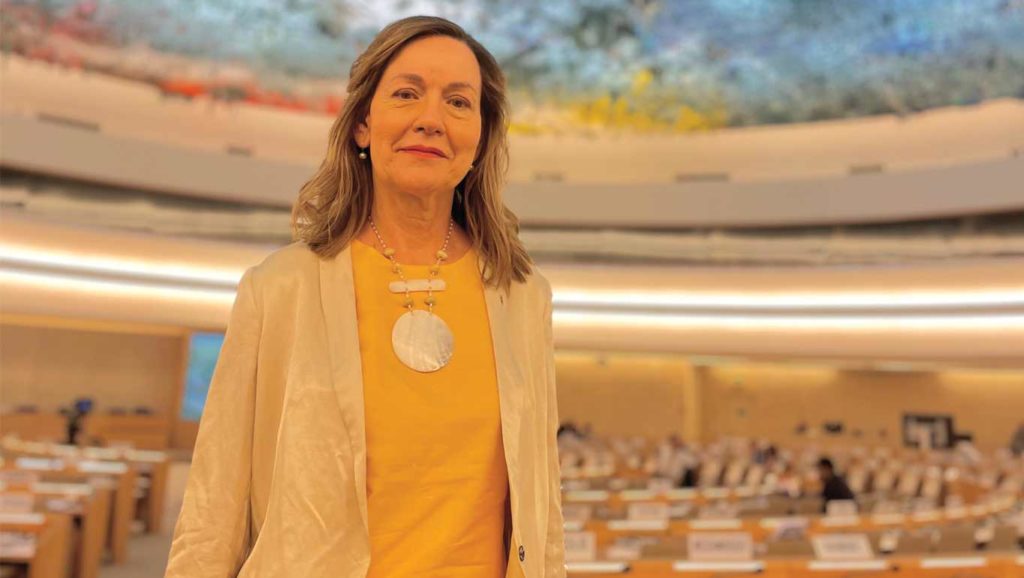As a former Senior United Nations Official now serving as an individual expert on the UN Human Rights Committee, please tell us about the mandate of the Human Rights Committee
The Human Rights Committee is a group of 18 independent human rights experts from all over the world who review countries’ compliance with the International Covenant on Civil and Political Rights (Covenant) and recommend ways to effectively improve their protection of civil and political rights. These rights span from freedom from torture and arbitrary detention, through to freedom of association, expression, thought and religion, and finally political participation. We collectively carry out three main roles. Firstly, we conduct country reviews to assess the progress of countries’ application of the Covenant, based on periodic reports, public discussions with officials known as “constructive dialogues,” and contributions from civil society organizations. Secondly, we have a juridical role. We decide on cases referred to as “communications” submitted by individuals who claim their Covenant rights have been violated by a state. Finally, we develop General Comments to clarify the meaning of particular rights, the international obligations that arise from them and good practice to assist countries in respecting these rights. Our most recent General Comment, #37, details ways to protect the right to peaceful assembly, a right people in many countries today are penalized for exercising.

Do UN treaty bodies have a positive impact on the human rights situation in countries?
Yes – frank engagement with the Human Rights Committee contributes to human rights improvements in many countries. An integral part of the process is periodic reporting where State parties evaluate their implementation of Covenant obligations. This analysis can prompt improvements even before the dialogue with the committee. The discussions in Geneva between the state and committee experts probe the main civil and political issues at play, and are webcast live on UN TV. These exchanges reinforce positive developments, identify gaps, and offer practices and steps to improve compliance. In my work at the UN, I visited countries to advise on governance reforms and saw the committee’s recommendations serve as the impetus and direction for reforming law, policy and practice in line with international standards. I also observed the positive impact domestic civil society organizations can have by publicizing recommendations and boosting the degree to which countries implement committee recommendations.
Where the committee’s decisions on individual cases of violations (“views”) are concerned, approximately a quarter of them have been at least partially implemented. The committee tracks and grades follow-up to both country reviews and views. Our follow-up procedure highlights the progressive changes countries make in direct response to our recommendations. Granted, very many of the observations and views we adopt are not taken up and this needs to change. However, even when not taken up by the state party in question, our decisions contribute to the development of international human rights law and are drawn upon as a source of law.
Are there any shortcomings in the system? In a few words, what are the main challenges the Committee faces in carrying out its mandate?
Support for human rights and the UN human rights architecture has waned in many countries over the last 30 years. Rising authoritarianism, populism, and limitations on civil society have made the need to ensure the exercise of universal human rights critical. At the same time, there is a high level of expectation from rightsholders, fueled by social media and other changes, that is not being met.
Not all of the 173 state parties engage with the Committee. Some countries are not willing to engage, while others do not have the requisite technical capacity as they find the Geneva-based process too difficult, remote and expensive. The level of compliance with committee recommendations leaves significant room for improvement if rightsholders are to be able to effectively exercise their civil and political rights. Our Committee has a steadily growing case backlog of over 1000 cases, which requires unmet financial and digital resources to resolve, thus rightsholders have to wait years for decisions. And 47 years after the Committee started operating, there are still 19 countries that have not ratified the Covenant. The low visibility of the work of the Committee outside of Geneva exacerbates all these challenges.
What reforms do you think are realistic in the current political climate?
To revitalize and increase engagement, committee processes could be “regionalized” to bring the committee closer to countries and the people we serve and increase respect for human rights. Holding some sessions in UN regional headquarters would improve visibility and accessibility to State parties, civil society, national human rights institutions, UN entities, and the media.
Regional sessions would increase awareness among all stakeholders of their rights and the mechanisms available for pursuing those rights. They would increase the engagement of regional UN entities that could provide programming support directly to countries. I know from my work at UN regional headquarters in Bangkok and Bratislava that there is tremendous capacity among UN organizations at the regional level – major development partners mandated to assist with national legal and policy reforms – to help countries implement the committee’s recommendations. With heightened awareness of the Committee’s role and recommendations, regional offices of the UN Development Programme, UN Women, UNICEF, UNFPA and other UN agencies would be well positioned to work with countries in the region to design development strategies and programmes to carry out recommended reforms. Supportive engagement by UN entities has the potential to vastly multiply the committee’s positive impact on the protection of human rights. And the awareness of officials in countries that have not yet ratified the Covenant could be raised about the benefits of constructive engagement with the committee, to foster ratification and engagement, and prompt reforms that concretely enable rightsholders to exercise their rights.


